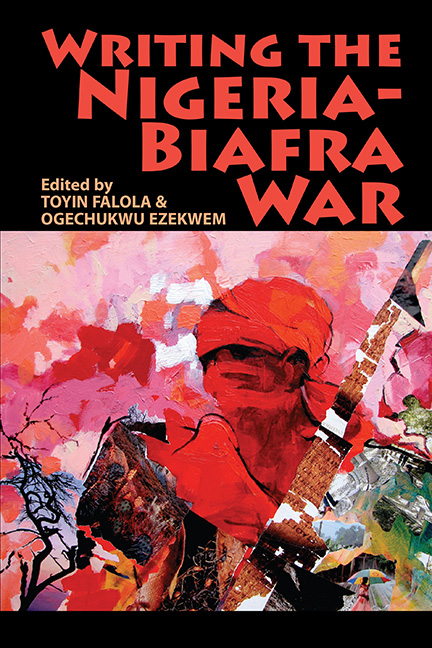Book contents
- Frontmatter
- Contents
- Notes on Contributors
- List of Abbreviations
- Timeline
- Map of Biafra 30 May 1967 – 1 May 1969
- 1 Scholarly Trends, Issues, and Themes: Introduction
- Part I On The History Of The Nigeria-Biafra War
- Part II Critical Debates On The Nigerian Crisis
- Part III The War In Fiction, Memoir, And Imagination
- Part IV Locating Gender In Nigeria-Biafra War Literature
- Select Bibliography
- Index
7 - Confronting the Challenges of Nationhood in Pre-Biafran Texts: Newspaper Narratives on the Eve of War
Published online by Cambridge University Press: 17 June 2021
- Frontmatter
- Contents
- Notes on Contributors
- List of Abbreviations
- Timeline
- Map of Biafra 30 May 1967 – 1 May 1969
- 1 Scholarly Trends, Issues, and Themes: Introduction
- Part I On The History Of The Nigeria-Biafra War
- Part II Critical Debates On The Nigerian Crisis
- Part III The War In Fiction, Memoir, And Imagination
- Part IV Locating Gender In Nigeria-Biafra War Literature
- Select Bibliography
- Index
Summary
Introduction
Before the first shots were fired by professional soldiers in the Nigeria-Biafra War (1967–1970), the issues at the center of the long-drawn crisis of statehood and nationhood in Nigeria were narrated and contested in the press. This is not surprising given that the press predated the corporate existence of Nigeria by more than half a century. Given the nature of the evolution of the newspaper press in the country and the fact that the key political leaders and public intellectuals who defined and largely determined the character of the emergent modern public sphere in colonial Nigeria were almost always journalists and/or newspaper proprietors, the press has been at the vortex of every important battle concerning Nigeria's history. Starting from the struggles over the modern urban formation; to governance in Abeokuta, Benin, Calabar, Lagos, and other areas near the coast; the interventions in colonial policies; to the crusades over the proper structural and ideological approaches to the interface of European Enlightenment and African tradition, the early newspaper press in Nigeria could be described as a battleground where ideological, cultural, and political ‘combatants’ took on one another.
As Nigeria approached independence between the early 1940s and the late-1950s, all the major ethno-regional blocs and the political parties representing these blocs seemed to have been united in recognizing the important role of the newspaper press in the struggles for ideological and cultural validation and political victories. In most cases, every major political issue was thoroughly debated on the pages of newspapers before they were either adopted or rejected. Examples include the controversies over the best political system for Nigeria (unitarism or federalism), the best constitutional arrangement, the status of the capital city (then Lagos), and the political economy of national unity. It is not a surprise, therefore, that every major political gladiator, ethno-regional grouping, and political party in this era had its own ideological mouthpiece: a newspaper. Each realized that the battle for the minds of men and women must be fought alongside other battles. Even though the bayonet and the pen are often contrasted in social history, in this chapter, based on an examination of the newspaper archive, I argue for an approach that takes the pen as ideological bayonet.
- Type
- Chapter
- Information
- Writing the Nigeria-Biafra War , pp. 130 - 165Publisher: Boydell & BrewerPrint publication year: 2016

